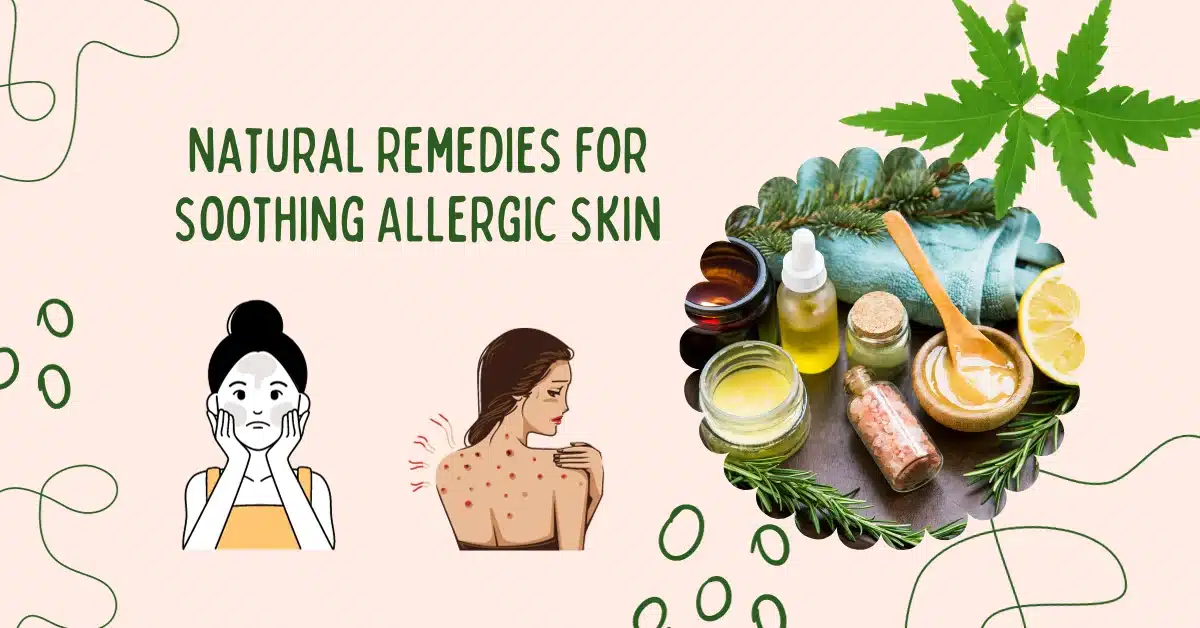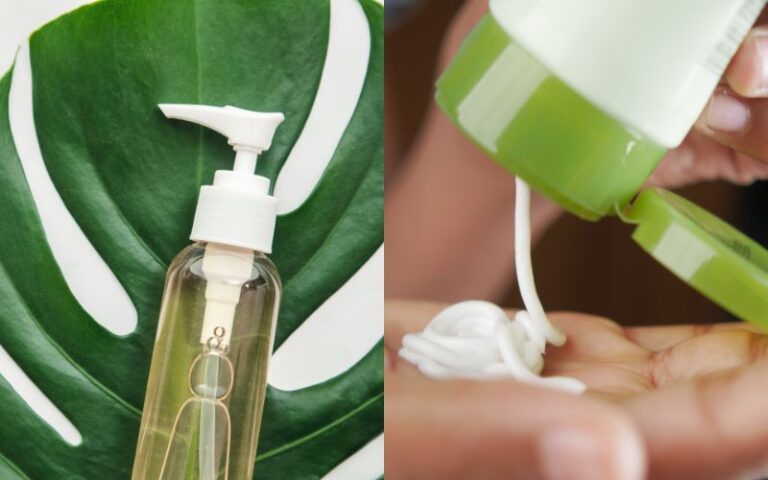Natural Remedies For Soothing Allergic Skin: Home Remedies And DIY Treatments

Natural remedies for allergic skin can be quite important for a bunch of reasons. First off, they often come with fewer side effects compared to fancy medications, which is great news for those of us with sensitive skin or medication/seasonal skin allergies.
Plus, these remedies are usually easy to find at home or your local store, so they won’t break the bank. They’re gentle on your skin and don’t involve any major procedures, which is a relief.
And let’s not forget about being eco-friendly – using natural stuff means fewer synthetic chemicals, which is good for both your skin and the environment. Plus, they can be tailored to your needs, promoting a holistic approach to skin health.
Let’s explore the gentle yet effective remedies that nature has to offer. Our carefully selected remedies are backed by research and expert insights, ensuring that you’re getting accurate information and safe, reliable solutions for your allergic skin.
So bid farewell to harsh chemicals and synthetic ingredients and embrace the power of nature to alleviate your skin woes. Get ready to discover a wealth of natural remedies that will not only soothe your allergic skin but also restore its health and radiance.
Table Of Contents
- Essential Oils For Allergic Skin Relief
- Herbal Remedies For Soothing Allergic Skin
- DIY Recipes For Natural Allergic Skin Remedies
- Embracing Natural Remedies For Long-Term Allergic Skin Care
Essential Oils For Allergic Skin Relief
Essential oils can be beneficial for allergic skin relief due to their natural anti-inflammatory, soothing, and antimicrobial properties. Here are some essential oils that are commonly used for allergic skin relief:
- Lavender Oil: Lavender oil is well-known for its calming and anti-inflammatory properties. It can help suppress redness, itching, and swelling associated with allergic skin reactions.
- Chamomile Oil: Chamomile oil, especially Roman chamomile, is anti-inflammatory and can help soothe irritated skin. It’s often used for conditions like eczema and dermatitis.
- Tea Tree Oil: Tea tree oil has antimicrobial and anti-inflammatory properties, making it useful for treating skin issues like rashes and itching caused by allergies.
- Peppermint Oil: Peppermint oil provides a cooling sensation and can help alleviate itching and discomfort. It’s important to dilute it with a carrier oil before skin application.
- Eucalyptus Oil: Eucalyptus oil has anti-inflammatory properties and can relieve itching. Dilute it and apply it topically, or add a few drops to a warm bath.
- Frankincense Oil: Frankincense has anti-inflammatory properties and can promote skin healing. It’s often used for allergic skin conditions like contact dermatitis.
- Geranium Oil: Geranium oil has anti-inflammatory and antimicrobial properties. It can help soothe and heal allergic skin reactions.
- Calendula Oil: Calendula oil is derived from marigold flowers and is known for its soothing and anti-inflammatory properties. It’s gentle and suitable for sensitive skin.
- Rosehip Oil: Rosehip oil is rich in essential fatty acids and antioxidants, which can help repair and hydrate the skin. It’s beneficial for dry, itchy skin caused by allergies.
- Helichrysum Oil: Helichrysum oil has anti-inflammatory and skin-healing properties, making it useful for allergic skin conditions and reducing redness and swelling.
Before skin application, remember to dilute essential oils with a carrier oil (such as jojoba oil, almond oil, or coconut oil) to prevent irritation.
Additionally, perform a patch test to assure you don’t have any adverse reactions to the oil. Essential oils should be used cautiously and are not a substitute for medical advice and treatment.
Herbal Remedies For Soothing Allergic Skin
Herbal remedies can offer natural relief for soothing allergic skin reactions. Here are some herbal remedies that are commonly used for this purpose:
- Calendula: Calendula, also known as marigold, is known for its anti-inflammatory and skin-soothing properties. You can apply calendula cream or ointment to the affected area.
- Chamomile: Chamomile has anti-inflammatory and calming properties. You can make chamomile tea and use it as a compress on irritated skin, or you can find chamomile-based creams and ointments.
- Witch Hazel: Witch hazel is an astringent herb that can help reduce itching and inflammation. Apply witch hazel extract to the skin using a cotton ball.
- Burdock Root: Burdock root is believed to have detoxifying properties that can help improve skin conditions. You can make burdock root tea or find it in herbal supplements.
- Echinacea: Echinacea is known for its immune-boosting properties and may help alleviate allergic skin reactions. You can find echinacea supplements or creams containing echinacea extract.
- Licorice Root: Licorice root has anti-inflammatory and soothing properties. You can make a licorice root tea and use it as a topical wash or find licorice-based creams.
- Oatmeal: Colloidal oatmeal, finely ground oats, is an excellent natural remedy for soothing itchy and irritated skin. Add it to your bath or make an oatmeal paste and directly apply it to your skin.
- Basil: Basil has anti-inflammatory properties and may help alleviate itching. Crush fresh basil leaves and apply the extracted juice to the affected area.
- Thyme: Thyme has antimicrobial and anti-inflammatory properties. You can make thyme tea and use it as a wash or find thyme-based creams.
- Agrimony: Agrimony is an herb known for its astringent and anti-inflammatory properties. You can make agrimony tea and apply it as a compress to the skin.
- Plantain: Plantain leaves, not to be confused with the banana-like fruit, have anti-inflammatory and soothing properties. Crush the leaves and apply them as a poultice to the irritated skin.
- St. John’s Wort: St. John’s Wort has anti-inflammatory and healing properties. You can find St. John’s Wort oil or ointments for topical use.
Remember to consult with a healthcare professional or herbalist before using herbal plant remedies, especially if you are pregnant, breastfeeding, or taking medications. It’s important to ensure that herbal remedies are safe and appropriate for your specific situation. If your symptoms persist or worsen, seek medical advice.
DIY Recipes For Natural Allergic Skin Remedies
You can try some of these homemade recipes for natural remedies to soothe allergic skin, all crafted using readily available household ingredients.
1. Aloe Vera Soothing Gel
Ingredients:
- Fresh aloe vera leaf or store-bought aloe vera gel
Instructions:
- Cut open the aloe vera leaf and scoop out the gel.
- Apply the gel directly to the affected area.
- Leave it on for 20-30 minutes, then rinse with cool water.
- Repeat as needed for relief.
How It Works:
Aloe vera gel soothes allergic skin through its anti-inflammatory properties, providing relief from redness, swelling, and itching. Its natural cooling effect eases discomfort, while its moisturizing capabilities combat dryness, common in allergic reactions.
Aloe vera accelerates skin healing, contains antibacterial properties to prevent infection, and helps remove allergens from the skin’s surface.
Applying pure aloe vera gel or products with a high aloe vera content to the affected area provides natural and effective relief for allergic skin reactions.
2. Oatmeal Bath
Ingredients:
- 1 cup colloidal oatmeal
- Warm bathwater
Instructions:
- Add the colloidal oatmeal to your warm bathwater.
- Soak in the bath for 15-20 minutes.
- Gently pat your skin dry with a clean towel.
How It Works:
An oatmeal bath is a soothing remedy for allergic skin reactions due to its anti-inflammatory and skin-soothing properties.
When finely ground oatmeal, known as colloidal oatmeal, is added to warm bathwater, it forms a protective barrier on the skin. This barrier helps to lock in moisture and reduce itching and inflammation caused by allergic reactions.
As you soak in the oatmeal-infused bath, the oatmeal works to soothe and calm irritated skin, making it an effective and natural way to find relief from itching, redness, and discomfort associated with allergic skin conditions.
3. Chamomile Tea Compress
Ingredients:
- 1 chamomile tea bag
- 1 cup hot water
- Clean cloth or gauze
Instructions:
- Steep the chamomile tea bag in hot water for a few minutes.
- Let the tea cool down.
- Soak a clean cloth or gauze in the chamomile tea.
- Apply the soaked cloth to the affected area for 10-15 minutes.
- Repeat as needed.
How It Works:
Chamomile tea compresses are effective in soothing allergic skin due to chamomile’s anti-inflammatory and calming properties.
Steeping a chamomile tea bag in hot water and applying it as a compress to the affected area can alleviate itching, redness, and irritation.
Chamomile contains compounds that help reduce skin inflammation, while its natural antioxidants promote skin healing. The coolness of the compress also provides immediate relief from discomfort.
This natural remedy is gentle and well-suited for sensitive skin, making it a valuable option for soothing allergic skin reactions.
4. Coconut Oil and Lavender Balm
Ingredients:
- 1/4 cup virgin coconut oil
- 10-12 drops lavender essential oil
Instructions:
- Mix the coconut oil and lavender essential oil in a small container.
- Apply a small amount to the irritated skin.
- Massage gently until absorbed.
- Reapply as necessary.
How It Works:
Coconut oil and lavender balm work effectively in soothing allergic skin by combining the natural anti-inflammatory properties of both ingredients. Coconut oil moisturizes the skin deeply, reducing dryness and preventing further irritation.
Lavender essential oil, renowned for its calming and healing properties, adds an extra layer of soothing relief.
When mixed together, they create a soothing balm that not only hydrates the skin but also reduces redness, itching, and inflammation caused by allergic reactions. The lavender’s pleasant aroma also promotes relaxation, contributing to overall skin comfort and well-being.
5. Apple Cider Vinegar Toner
Ingredients:
- 1 part apple cider vinegar
- 3 parts water
Instructions:
- Mix the apple cider vinegar and water in a clean container.
- Use a cotton ball to apply the mixture to the affected area.
- Let it air dry.
- Use it 2-3 times a day for relief.
How It Works:
Apple cider vinegar (ACV) toner can effectively soothe allergic skin due to its natural anti-inflammatory and antimicrobial properties.
When diluted with water, ACV creates a gentle toner that balances skin pH and reduces inflammation. It helps alleviate itching, redness, and discomfort associated with allergic reactions. ACV’s antimicrobial action can also aid in preventing secondary infections.
Applying the toner with a cotton ball to the affected area provides relief while promoting skin health. However, it’s crucial to dilute ACV properly and perform a patch test to ensure it does not cause further irritation, especially for those with sensitive skin.
6. Honey and Cucumber Mask
Ingredients:
- 2 tablespoons raw honey
- 1/2 cucumber, blended
Instructions:
- Mix the raw honey and cucumber puree.
- Apply the mixture to the irritated skin.
- Leave it on for 20-30 minutes.
- Rinse with cool water and pat dry.
How It Works:
A honey and cucumber mask effectively soothes allergic skin by combining the anti-inflammatory and antimicrobial properties of honey with the cooling and hydrating qualities of cucumber.
Honey’s natural healing abilities reduce redness and itching while preventing bacterial infections. Cucumber’s high water content hydrates and calms the skin, reducing irritation. Together, they create a gentle, natural remedy that alleviates discomfort and promotes skin healing.
This mask offers both immediate relief and long-term benefits for allergic skin reactions, making it a valuable option for those seeking natural, soothing skincare solutions.
7. Witch Hazel Spray
Ingredients:
- 1/4 cup witch hazel
- 1/4 cup distilled water
Instructions:
- Mix the witch hazel and distilled water in a spray bottle.
- Spray the solution onto the affected skin and allow it to air dry.
- Use it as needed for relief.
How It Works:
Witch hazel spray effectively soothes allergic skin due to its natural astringent and anti-inflammatory properties.
When sprayed onto the affected area, witch hazel constricts blood vessels, reducing redness and swelling associated with allergic reactions. It also helps relieve itching and discomfort. Additionally, witch hazel has mild antiseptic properties, which can assist in preventing infections on the irritated skin.
Its ease of application and quick absorption make it a convenient choice for soothing allergic skin, providing immediate relief while promoting overall skin health. However, it’s important to ensure that the witch hazel spray used is alcohol-free to avoid potential irritation.
8. Calendula Salve
Ingredients:
- 1/2 cup dried calendula petals
- 1 cup olive oil
- 2 tablespoons beeswax pellets
Instructions:
- Infuse the olive oil with dried calendula petals. Place the petals in a jar, cover with olive oil, and let sit in a sunny spot for a few weeks.
- Strain the infused oil into a double boiler.
- Add beeswax pellets and heat gently until the wax melts and combines with the oil.
- Pour the mixture into a container and let it cool and solidify. Use as needed on irritated skin.
How It Works:
Calendula salve effectively soothes allergic skin through the remarkable anti-inflammatory and skin-healing properties of calendula flowers. When applied to the affected area, this salve forms a protective barrier, reducing irritation and redness.
Calendula’s natural compounds help to calm the skin, alleviate itching, and promote tissue repair. Its gentle and hypoallergenic nature makes it suitable for sensitive skin.
Calendula salve not only provides immediate relief from allergic reactions but also supports long-term skin health by aiding in the healing process, making it a valuable choice for those seeking natural remedies for skin irritations.
A Word of Caution: Always perform a patch test before applying any DIY remedy to your skin, especially if you have known allergies or sensitivities. If your symptoms persist or worsen, consult a healthcare professional for proper diagnosis and treatment.
Embracing Natural Remedies For Long-Term Allergic Skin Care
Embracing natural remedies for long-term allergic skin care offers a holistic and sustainable approach to managing skin issues. These remedies, often derived from plants and herbs, harness the power of nature to soothe irritation, reduce inflammation, and provide relief without the potential side effects of harsh chemicals.
By incorporating natural ingredients into our skincare routines, we can nurture our skin’s health over the long term, addressing not just the symptoms but also the underlying causes of allergic reactions. This approach not only promotes healthier skin but also aligns with environmentally friendly and eco-conscious practices.
While natural remedies can be super helpful, keep in mind that everyone’s different, so what works for one person might not work for another. If your skin issues stick around or get worse, don’t hesitate to see a healthcare pro. So, they’re not a cure-all, but natural remedies definitely have their perks when it comes to taking care of your skin.
Moreover, it’s essential to remember that natural remedies should complement, not replace, medical advice when needed, and consulting with a healthcare professional remains crucial for severe or persistent skin conditions.
FAQs
Q: What are the best natural remedies for soothing allergic skin?
A: Some of the best natural remedies for soothing allergic skin include aloe vera gel, oatmeal baths, chamomile tea compresses, and coconut oil. These remedies are known for their anti-inflammatory and soothing properties.
Q: How does aloe vera gel work in soothing allergic skin?
A: Aloe vera gel works in soothing allergic skin by providing anti-inflammatory relief, reducing redness, and offering a cooling sensation. It also helps moisturize the skin and promotes healing.
Q: Can I use essential oils for allergic skin relief?
A: Yes, essential oils like lavender, chamomile, and tea tree oil can be used for allergic skin relief. Dilute them with a carrier oil and apply sparingly to soothe itching and inflammation.
Q: What is colloidal oatmeal, and how does it help with allergic skin?
A: Colloidal oatmeal is finely ground oatmeal that when added to bathwater, creates a protective barrier on the skin. It reduces itching and inflammation, making it effective for allergic skin relief.
Q: Are there any precautions I should take when using natural remedies for allergic skin?
A: When using natural remedies for allergic skin, it’s essential to conduct a patch test to check for allergies or sensitivities. Additionally, consult a healthcare professional if symptoms persist or worsen.
Q: How does apple cider vinegar toner work in soothing allergic skin?
A: Apple cider vinegar toner works by balancing skin pH, reducing inflammation, and alleviating itching associated with allergic skin reactions. It also has mild antimicrobial properties.
Q: What is the role of chamomile tea compresses in allergic skin relief?
A: Chamomile tea compresses provide allergic skin relief by harnessing chamomile’s anti-inflammatory and calming properties. Applying them as compresses can reduce redness, itching, and irritation.
Q: Can I use natural remedies for long-term allergic skin care?
A: Yes, embracing natural remedies for long-term allergic skin care is a holistic and sustainable approach. These remedies can help address underlying causes and promote overall skin health.
Q: What are some herbal remedies for soothing allergic skin?
A: Herbal remedies like calendula, witch hazel, and burdock root can soothe allergic skin due to their anti-inflammatory and healing properties. They provide relief and promote skin recovery.
Q: How does coconut oil and lavender balm work in soothing allergic skin?
A: Coconut oil and lavender balm soothe allergic skin by combining anti-inflammatory and calming properties. Coconut oil moisturizes, and lavender reduces redness, itching, and inflammation.
References
https://www.healthline.com/health/skin-allergy-home-remedy
https://www.everydayhealth.com/skin-and-beauty/natural-skin-remedies.aspx





